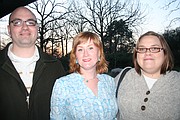KABUL, Afghanistan (AP) - In Afghanistan's first major sectarian assault since the fall of the Taliban regime a decade ago, a suicide bomber slaughtered 56 Shiite worshippers and wounded more than 160 others Tuesday outside a Shiite shrine in the capital.
The body of a woman, clutching a dead child in each arm, was sprawled along a dirt road littered with shoes, bloodstained clothing, hats and body parts after the blast, which took place as a bombing killed four Shiites in the northern city of Mazar-i-Sharif.
A loudspeaker at the shrine blasted a recitation of the Quran as ambulances with loud sirens rushed in to carry away the dead and wounded. Outside a hospital in Kabul, a man sobbing with other relatives cried out "Mother! My mother!"
The Taliban condemned the attack, which was reminiscent of the wave of sectarian bloodshed that shook Iraq during the height of the war there. Suspicion centered on militant groups based in neighboring Pakistan where Sunni attacks on minority Shiites are common.
A man who claimed to be from Lashkar-e-Jhangvi, a Pakistan-based group that has carried out attacks against Shiite Muslims, called various media outlets in Pakistan to claim responsibility for the bombing in Kabul. The validity of the claim could not be determined.
Until now, the decade-long Afghan war has largely been spared sectarian violence, where civilians are targeted simply for their membership in a particular religious group. Tuesday's attack suggests that at least some militant groups may have shifted tactics, taking aim at ethnic minorities such as the Hazara who are largely Shiite and support the Afghan government and its Western partners.
The Afghan Taliban, who are mostly ethnic Pashtuns and nearly all Sunni Muslims, had been attempting to diversify their ranks, expanding to areas outside their southern homeland, recruiting some Tajiks and others and forging an alliance with Uzbek militants in the north in an attempt to present themselves as a national resistance movement.
Tuesday's powerful explosion in Kabul was the deadliest attack in the capital since July 7, 2008, when a suicide car bombing at the gates of the Indian Embassy killed more than 60 people.
The bomb went off shortly before noon as bare-chested men were beating and cutting themselves with knives and chains to mourn the death of one of their most beloved saints. They had gathered at the Abul Fazl shrine with a blue minaret to mark the holiday called Ashoura, which honors the death of Imam Hussein, a grandson of the Prophet Muhammad, in 680 A.D.
Black and gray smoke spiraled skyward from the bomb site after the blast. Lifeless bodies were lying on top of one another. Survivors with blood-smeared faces cried for help.

